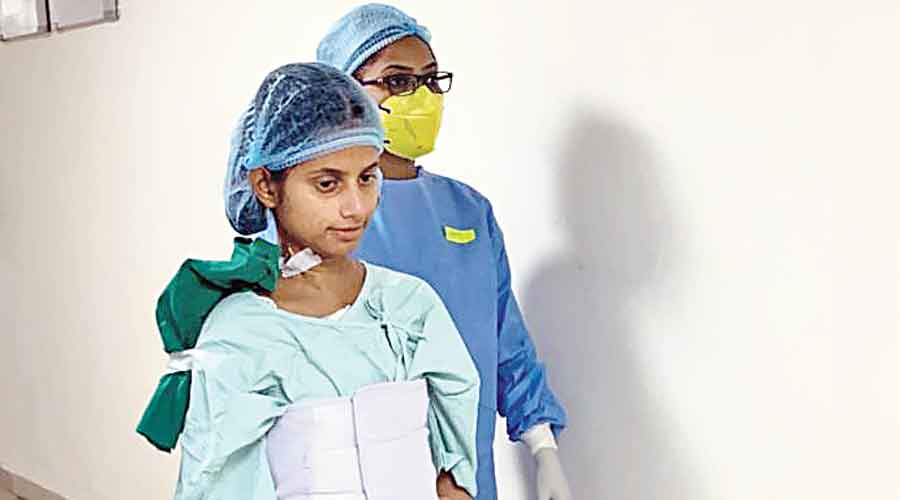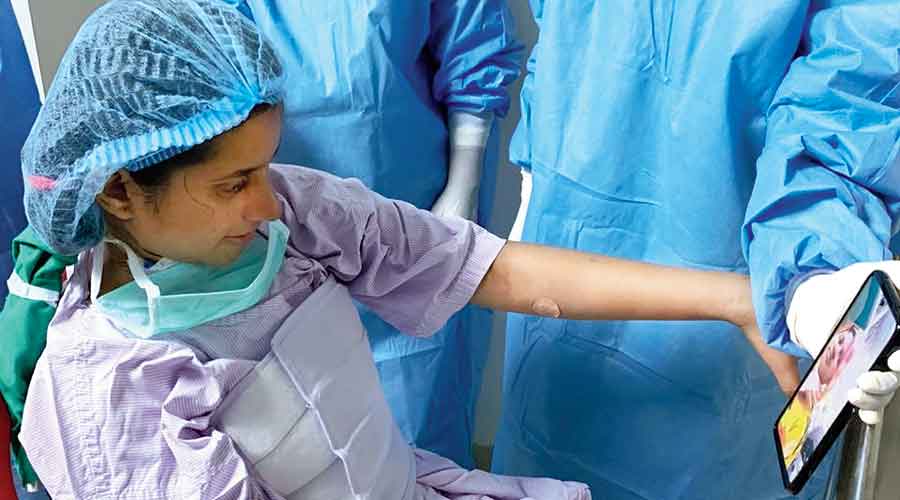A 17-year-old girl from a village in East Midnapore is looking ahead to a life with a new heart.
Ahsana Khatun walked without support for the first time on Monday since undergoing a heart transplant a week ago. After that almost symbolic demonstration of her will to stand on her own feet, Ahsana told Metro that she was keen to return to school at the earliest and write Madhyamik next year.
She could not sit for her Class X boards this year because her heart was incapable of taking the strain.
The resident of Kumarpur village in East Midnapore underwent the transplant at Narayana Superspeciality Hospital in Howrah on August 17. A week on, she walked slowly without any support, said doctors.
“The first thing I want to do after recovering fully is go back to school. I could not sit for Madhyamik this year because of my illness. But I want to write the papers next year,” Ahsana said on Monday from her hospital bed.

Ahsana walks without support on Monday, the first time since the transplant a week ago Telegraph picture
About two years back she was diagnosed with dialectic cardiomyopathy, a condition in which the heart’s pumping muscles keep weakening and the organ fails to pump adequate blood to the rest of the body.
Doctors said Ahsana would suffer from severe respiratory distress as fluids accumulate in the lungs, along with other organs. The condition, which doctors said leads to heart failure, forced Ahsana to miss classes as she needed to be admitted to hospital often.
“I had been feeling unwell for the last three years and would frequently miss school and could not play with my sisters and brothers,” said Ahsana, a Class X student of Omarpur High Madrasa.
When she was in Class VI, Ahsana had developed a hearing problem that still persists. “My parents had then said I must complete my education. Once I fully recover, I want to get back to school and study as far as I can,” said Ahsana, whose favourite read is Tagore’s poetry.
Ahsana’s condition had been worsening over the past two years as her heart was steadily losing its capacity to pump blood. “She had to be admitted to hospital four times over the past three months because of heart failures. About four months back, we enlisted her for heart transplant,” said Debasis Das, the cardiac surgeon who led the transplant team that operated on Ahsana for four hours.
“Every time she was admitted to hospital, we would give her some medicine and discharge her. Because of the Covid-19 pandemic, we didn’t want to keep her in hospital for long.”
Along with Das, cardiac surgeon Nilanjan Dutta and pediatric cardiologist Amitabha Chattopadhyay treated the patient.
Ahsana said she would always leave the hospital depressed. “I would feel very depressed after reaching home from the hospital. I would be anxious about what would happen to me. Then I would sit and listen to Tagore songs,” she said.
Finally, on the evening of August 16, the hospital got a call from an official of the regional organ and tissue transplant organisation of the state health department that a young man had died and his organs were donated by his family. The parameters matched Ahsana’s.
“We contacted Ahsana’s father and asked him whether he could bring her to Calcutta as soon as possible. He hired a vehicle and reached the hospital with his daughter,” said Das.
The heart was harvested from the donor’s body at Apollo Gleneagles Hospitals.
“In about two to three months, Ahsana would be able to go back to near-normal life, including attending classes,” said Das.

The teenager speaks to her mother on a video call Telegraph picture
Ahsana said she was feeling much better than she had in the past three years. “I can’t wait to go back home, this time cured,” she said.
Her father, Sk Hidayatullah, the imam of a mosque in East Midnapore, said he had been worried about the cost of treatment of Ahsana, the eldest of his three daughters.
“I went to SSKM Hospital but could not get her treated. I was worried about how to raise money for her treatment but said yes when doctors at the private hospital asked whether I wanted my daughter to be treated there,” he said.
The hospital authorities later told him that he need not pay anything and they would take care of her cost of treatment.
“The total cost of her treatment was around Rs 10 lakh. Our patient support cell helped in raising funds through donors and various funding agencies. The rest of the cost was borne by the hospital,” said R. Venkatesh, regional director, east, Narayana Health, which runs the Howrah hospital.










